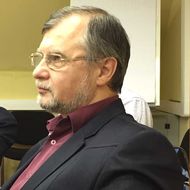Springer, one of the world's leading publishers of scientific literature, has launched a new book series, entitled ‘Societies and political orders in transition’. The series has been initiated by the HSE Faculty of Social Sciences, and three HSE representatives are members of the series International Advisory Board, with the other four members coming from universities in Germany, UK and the USA.
В старых версиях браузеров сайт может отображаться некорректно. Для оптимальной работы с сайтом рекомендуем воспользоваться современным браузером.
✖
- A
- A
- A
- ABC
- ABC
- ABC
- А
- А
- А
- А
- А
Regular version of the site
ФКН
- HSE University
- Faculties
- Faculty of Social Sciences
- School of Political Science
- News
- Tag "publications"
3 Krivokolenny Pereulok, Moscow, 103070.
Phones:
8 (495) 772-95-90 *22833,
8 (495) 772-95-90 *22448
Fax: 8 (495) 772-95-90 *12556
Email: politfac@hse.ru
Administration
Book
Washington: Free Russia, 2018.
Article
Petrov N., Hale H. E., Lipman M.
Russian Politics. 2019. Vol. 4. No. 2. P. 168-195.
Book chapter
In bk.: Oxford Research Encyclopedia of Politics (Living Edition). Oxford University Press. P. 1-20.
Working paper
Sorokina A., Maximenkova M., Kasamara V.
Political Science. PS. Высшая школа экономики, 2019. No. 71.
Tag "publications" – News

The book ‘Leading from the Periphery and Network Collective Action’ by Associate Professor of the School of Political Science of HSE Navid Hassanpour was issued by Cambridge University Press.
December 05, 2016


November 30, 2016

More than twenty years after the collapse of the socialist bloc, virtually none of the post-communist countries have attained the level of socioeconomic development characteristic of advanced democracies. Likewise, none of the post-communist countries have emerged as successful autocracies with high-quality public institutions, such as those found in Singapore or Oman. Professor Andrei Melville, Dean of the HSE Faculty of Social Sciences, and Mikhail Mironyuk, Associate Professor of the HSE School of Political Science, examine possible reasons why it is so.
September 23, 2015

The book ‘Democracy in a Russian Mirror’ edited by Adam Przeworski was issued by Cambridge University Press in May 2015. Three of the authors — Boris Makarenko, Andrei Melville and Mikhail Ilyin — are staff members of the School of Political Science.
September 02, 2015

An article “Bad enough governance': state capacity and quality of institutions in post-Soviet autocracies” written by Andrei Melville and Mikhail Mironyuk was published in the Post-Soviet Affairs journal. The article contributes to current discussions on state capacity, quality of institutions, and political regimes.
June 22, 2015

HSE's publishing house has published the Russian version of the Oxford University Press textbook 'Democratization' edited by Christian Haerpfer, Patrick Bernhagen, Ronald Inglehart and Christian Welzel.
April 02, 2015

Eastern European history shows that in the majority of post-Soviet countries, where lustration was carried out in one form or another, the situation with corruption is now considerably better than in those countries where lustration was not carried out. But what we see in Slovenia is, in fact, an clear deviation from this pattern. Lustration was not carried out in Slovenia. Nonetheless, the country is among the best performers in terms of anti-corruption measures and can be compared with Estonia, where lustration did take place. The Slovenia phenomenon has been analysed in the article ‘Fighting Corruption: The Slovenian Phenomenon’ by Yuliy Nisnevich, Professor at the School of Political Science, Academic Supervisor of the Laboratory for Anti-Corruption and Heather Stetten, independent researcher (USA).
March 30, 2015

A special issue of Osteuropa journal (Berlin) has been published, and four authors from the HSE Faculty of Social Sciences participated in it. The topic of the issue is ‘The People and its “I”: Authoritarian Rule and Legitimacy’.
December 03, 2014
- About
- About
- Key Figures & Facts
- Sustainability at HSE University
- Faculties & Departments
- International Partnerships
- Faculty & Staff
- HSE Buildings
- Public Enquiries
- Studies
- Admissions
- Programme Catalogue
- Undergraduate
- Graduate
- Exchange Programmes
- Summer University
- Summer Schools
- Semester in Moscow
- Business Internship
-
https://elearning.hse.ru/en/mooc/
Massive Open Online Courses
-
https://www.hse.ru/en/visual/
HSE Site for the Visually Impaired
-
http://5top100.com/
Russian Academic Excellence Project 5-100
- © HSE University 1993–2024 Contacts Copyright Privacy Policy Site Map
- Edit

